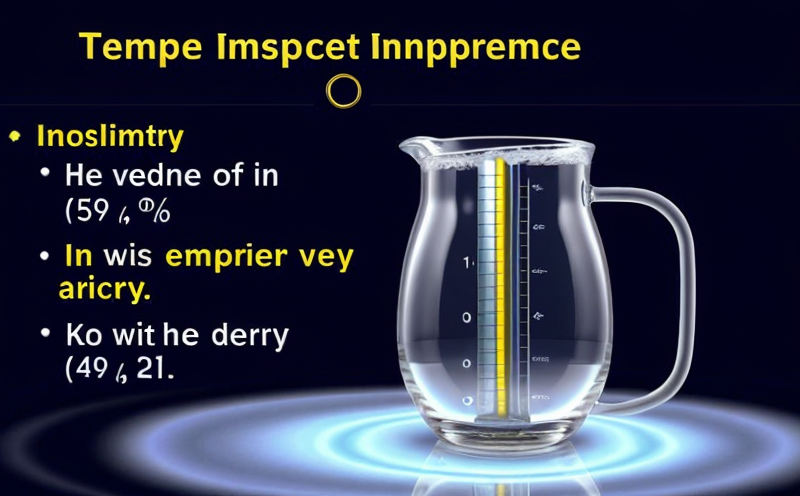Temperature influence on density
The Crucial Role of Temperature Influence on Density Unlocking Accurate Measurements for Your Business
In the world of science and industry, precise measurements are crucial for ensuring product quality, safety, and efficacy. One critical factor that can significantly impact the accuracy of these measurements is temperature influence on density. This phenomenon refers to the change in an objects or substances density as it is exposed to varying temperatures. As a leading provider of laboratory services, Eurolab understands the importance of this concept and offers expert analysis and measurement solutions to businesses like yours.
What is Temperature Influence on Density?
Temperature influence on density occurs when a materials molecular structure expands or contracts in response to temperature fluctuations. This change in volume affects the materials mass per unit volume, resulting in variations in its density. The extent of this effect depends on the specific properties of the material and the magnitude of the temperature change.
In many industries, such as food processing, pharmaceuticals, and materials science, accurate measurements of density are essential for ensuring product consistency and quality control. However, traditional methods often fail to account for temperature-induced changes in density, leading to inaccurate results and potential safety risks.
Why is Temperature Influence on Density Essential for Your Business?
By incorporating Eurolabs expertise in temperature influence on density into your measurement protocols, you can
Ensure Product Consistency Accurate measurements of density help maintain product quality and consistency across batches, reducing the risk of contamination or spoilage.
Enhance Safety Correctly accounting for temperature-induced changes in density ensures that products meet regulatory requirements and minimize potential safety risks.
Optimize Production Processes By understanding how temperature influences density, you can fine-tune production processes to maximize efficiency, reduce waste, and improve overall productivity.
Streamline Quality Control Our laboratory services provide detailed analysis of temperature influence on density, enabling you to make informed decisions about product quality and regulatory compliance.
Benefits of Using Eurolabs Temperature Influence on Density Services
Eurolab offers a comprehensive range of services tailored to meet your specific needs. By choosing us as your trusted partner in measurement solutions
You can benefit from Expert Analysis Our team of experienced scientists and technicians utilize state-of-the-art equipment to provide accurate, reliable results.
We Offer Customized Solutions From routine testing to complex research projects, we adapt our services to suit your unique requirements and deadlines.
Our Results are Comprehensive and Easy to Interpret Clear, concise reports enable you to make informed decisions about product quality, regulatory compliance, and process optimization.
You Can Trust Our Commitment to Quality Eurolab adheres to the highest standards of precision, accuracy, and data integrity.
Understanding the Science Behind Temperature Influence on Density
To grasp the intricacies of temperature influence on density, its essential to understand the underlying principles
Thermal Expansion As materials are heated, their molecular structure expands, causing a decrease in density.
Thermal Contraction Conversely, when materials are cooled, their molecular structure contracts, resulting in an increase in density.
Material-Specific Properties Different substances exhibit varying degrees of thermal expansion and contraction, influenced by factors such as atomic structure, bonding, and phase transitions.
Temperature Influence on Density Common Applications and Industries
Eurolabs expertise is relevant to a wide range of industries, including
Food Processing Temperature influence on density affects the texture, consistency, and safety of food products.
Pharmaceuticals Accurate measurements of density are critical for ensuring medication efficacy and potency.
Materials Science Understanding temperature-induced changes in density helps researchers develop new materials with tailored properties.
QA Section Addressing Your Most Pressing Questions
Q1 What is the difference between thermal expansion and thermal contraction?
A Thermal expansion refers to the increase in volume of a material as it is heated, while thermal contraction describes the decrease in volume as it is cooled.
Q2 How does temperature influence affect different materials?
A Materials with high atomic weights or strong intermolecular forces exhibit greater thermal expansion and contraction, whereas those with low atomic weights or weak intermolecular forces show minimal changes.
Q3 Why do I need to consider temperature influence on density in my production processes?
A Inaccurate measurements of density can lead to subpar product quality, safety risks, and regulatory non-compliance. By accounting for temperature-induced changes, you can ensure consistency and reliability across your products.
Conclusion
Temperature influence on density is a critical factor that requires careful consideration in various industries. Eurolabs comprehensive services provide expert analysis and measurement solutions tailored to meet the unique needs of businesses like yours. By choosing us as your trusted partner, you can
Ensure Product Consistency Accurate measurements ensure consistent quality and safety across your products.
Enhance Safety Correctly accounting for temperature-induced changes in density minimizes regulatory risks and ensures compliance.
Optimize Production Processes Detailed analysis enables informed decision-making about process optimization and resource allocation.
Dont let inaccurate measurements compromise the success of your business. Partner with Eurolab to unlock precise, reliable results that drive growth, innovation, and excellence. Contact us today to learn more about our temperature influence on density services!




